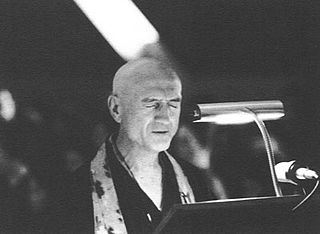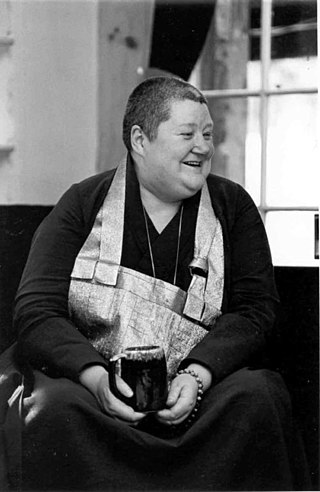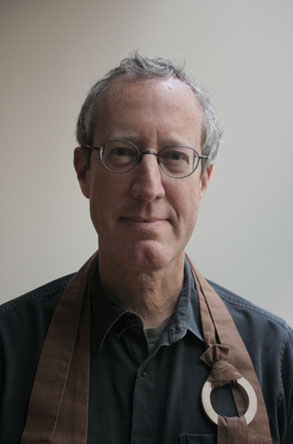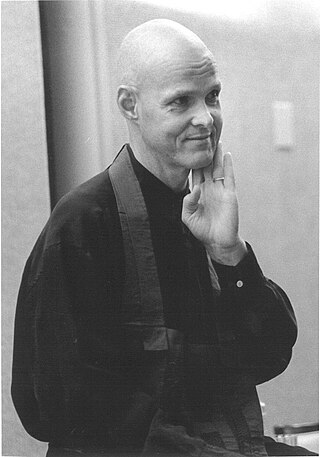
The Triratna Buddhist Community (formerly the Friends of the Western Buddhist Order (FWBO)) is an international fellowship of Buddhists and others who aspire to its path of mindfulness. It was founded in the UK in 1967 by Sangharakshita (born Dennis Philip Edward Lingwood) and describes itself as "an international network dedicated to communicating Buddhist truths in ways appropriate to the modern world". In keeping with Buddhist traditions, it also pays attention to contemporary ideas, particularly drawn from Western philosophy, psychotherapy, and art.
Buddhism in the West broadly encompasses the knowledge and practice of Buddhism outside of Asia in the Western world. Occasional intersections between Western civilization and the Buddhist world have been occurring for thousands of years. The first Westerners to become Buddhists were Greeks who settled in Bactria and India during the Hellenistic period. They became influential figures during the reigns of the Indo-Greek kings, whose patronage of Buddhism led to the emergence of Greco-Buddhism and Greco-Buddhist art. There was little contact between the Western and Buddhist cultures during most of the Middle Ages but the early modern rise of global trade and mercantilism, improved navigation technology and the European colonization of Asian Buddhist countries led to increased knowledge of Buddhism among Westerners. This increased contact led to various responses from Buddhists and Westerners throughout the modern era. These include religious proselytism, religious polemics and debates, Buddhist modernism, Western convert Buddhists and the rise of Buddhist studies in Western academia. During the 20th century, there was a growth in Western Buddhism due to various factors such as immigration, globalization, the decline of Christianity and increased interest among Westerners. The various schools of Buddhism are now established in all major Western countries making up a small minority in the United States, Europe, Australia and New Zealand.
Engaged Buddhism, also known as socially engaged Buddhism, refers to a Buddhist social movement that emerged in Asia in the 20th century. It is composed of Buddhists who seek to apply Buddhist ethics, insights acquired from meditation practice, and the teachings of the Buddhist dharma to contemporary situations of social, political, environmental, and economic suffering, and injustice.

Philip Kapleau was an American teacher of Zen Buddhism in the Sanbo Kyodan tradition, which is rooted in Japanese Sōtō and incorporates Rinzai-school koan-study. He also strongly advocated for Buddhist vegetarianism.

Robert Baker Dairyu Chotan Aitken Rōshi was a Zen teacher in the Harada-Yasutani lineage. He co-founded the Honolulu Diamond Sangha in 1959 together with his wife, Anne Hopkins Aitken. Aitken received Dharma transmission from Koun Yamada in 1985 but decided to live as a layperson. He was a socialist advocating social justice for homosexuals, women and Native Hawaiians throughout his life, and was one of the original founders of the Buddhist Peace Fellowship.

Hōun Jiyu-Kennett, born Peggy Teresa Nancy Kennett, was a British roshi most famous for having been the first female to be sanctioned by the Sōtō School of Japan to teach in the West.

The term American Buddhism can be used to describe all Buddhist groups within the United States, including Asian-American Buddhists born into the faith, who comprise the largest percentage of Buddhists in the country.

The Kwan Um School of Zen (관음선종회,觀音禪宗會) (KUSZ) is an international school of zen centers and groups founded in 1983 by Zen Master Seung Sahn. The school's international head temple is located at the Providence Zen Center in Cumberland, Rhode Island, which was founded in 1972 shortly after Seung Sahn first came to the United States. The Kwan Um style of Buddhist practice combines ritual common both to Korean Buddhism as well as Rinzai school of Zen, and their morning and evening services include elements of Huayan and Pure Land Buddhism. While the Kwan Um Zen School comes under the banner of the Jogye Order of Korean Seon, the school has been adapted by Seung Sahn to the needs of Westerners. According to James Ishmael Ford, the Kwan Um School of Zen is the largest Zen school in the Western world.

Japanese Zen refers to the Japanese forms of Zen Buddhism, an originally Chinese Mahāyāna school of Buddhism that strongly emphasizes dhyāna, the meditative training of awareness and equanimity. This practice, according to Zen proponents, gives insight into one's true nature, or the emptiness of inherent existence, which opens the way to a liberated way of living.
Gil Fronsdal is a Norwegian-born, American Buddhist teacher, writer and scholar based in Redwood City, California. He has been practicing Buddhism of the Sōtō Zen and Vipassanā sects since 1975, and is currently teaching the practice of Buddhism in the San Francisco Bay Area. Having been taught by the Vipassanā practitioner Jack Kornfield, Fronsdal is part of the Vipassanā teachers' collective at Spirit Rock Meditation Center. He was ordained as a Sōtō Zen priest at the San Francisco Zen Center in 1982, and was a Theravāda monk in Burma in 1985. In 1995, he received Dharma transmission from Mel Weitsman, the abbot of the Berkeley Zen Center.

Bernie Glassman was an American Zen Buddhist roshi and founder of the Zen Peacemakers, an organization established in 1980. In 1996, he co-founded the Zen Peacemaker Order with his late wife Sandra Jishu Holmes. Glassman was a Dharma successor of the late Taizan Maezumi-roshi, and gave inka and Dharma transmission to several people.
Shinge-shitsu Roko Sherry Chayat is the former abbot of the Zen Studies Society, based at the International Dai Bosatsu Zendo Kongo-ji monastery, outside Livingston Manor, NY, and at the New York Zendo Shobo-Ji on the Upper east Side of Manhattan. She is also the abbot of the Zen Center of Syracuse Hoen-ji. Chayat is an advocate for the use of meditation in medical settings, with Hoen-ji running the program Well/Being Contemplative Practices for Healing for healthcare professionals.

Women in Buddhism is a topic that can be approached from varied perspectives including those of theology, history, anthropology, and feminism. Topical interests include the theological status of women, the treatment of women in Buddhist societies at home and in public, the history of women in Buddhism, and a comparison of the experiences of women across different forms of Buddhism. As in other religions, the experiences of Buddhist women have varied considerably.

Enkyō Pat O'Hara is a Soto Zen priest and teacher in the Harada-Yasutani lineage of Zen Buddhism.
The Pacific Zen Institute (PZI), is a Zen Buddhist school centered in Santa Rosa, California, with affiliates in Oakland, San Mateo, Santa Barbara, and Waco, Kentucky. Its students live and practice throughout North America, South America, and Asia. Established in 1999, Pacific Zen's stated mission is to "create a culture of transformation through meditation, koans, conversation, and the arts." Its founding director, John Tarrant, was the first dharma heir to Robert Baker Aitken, in the line of the Sanbo Kyodan school of koan Zen.

Angie Boissevain is a Sōtō Zen priest leading the Floating Zendo in San Jose, California. A Dharma heir of Vanja Palmers, for many years she was director and then teacher of Jikoji in the Santa Cruz Mountains. Today (2012) she leads meditation retreats in California.

Merle Kodo Boyd (1944–2022) was an American Zen Buddhist nun. She was the first African-American woman to receive Dharma transmission in Zen Buddhism, as a Dharma heir of Wendy Egyoku Nakao in the White Plum Asanga. Receiving transmission in March 2006, she founded and led the Lincroft Zen Sangha in New Jersey that is currently part of the Zen Peacemaker Circle established by Tetsugen Bernard Glassman and his wife Sandra Jishu Holmes.
The Zen Peacemakers is a diverse network of socially engaged Buddhists, currently including the formal structures of the Zen Peacemakers International, the Zen Peacemaker Order and the Zen Peacemaker Circles, many affiliated individuals and groups, and communities formed by Dharma Successors of Roshi Bernie Glassman. It was founded by Bernie Glassman and his second wife Sandra Jishu Holmes in 1996, as a means of continuing the work begun with the Greyston Foundation in 1980 of expanding Zen practice into larger spheres of influence such as social services, business and ecology but with a greater emphasis on peace work. Eve Marko, Bernie Glassman's third wife, is a founding teacher of the Zen Peacemaker Order. Zen Peacemakers have developed from the White Plum Asanga lineage of Taizan Maezumi.

Barry Magid is a psychoanalyst and Zen teacher whose life and work have been on the forefront of a movement to integrate Western psychology with Eastern spiritual practices. He teaches at the Ordinary Mind Zendo in New York City. OMZ is part of the Ordinary Mind Zen School, a network of independent Zen centers established by Charlotte Joko Beck and her Dharma Successors in 1995.

Tenshin Zenki Reb Anderson is an American Buddhist who is a Zen teacher in the Sōtō Zen tradition of Shunryu Suzuki. He is a Senior Dharma teacher at the San Francisco Zen Center and at Green Gulch Farm Zen Center in Marin County, California, where he lives. According to author James Ishmael Ford, "Reb Anderson is one of the most prominent of contemporary Western Zen teachers."













